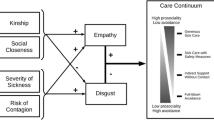Abstract
The evolution of human cooperativity can be explained to a considerable extent on the basis of “kin selection” and generalized concepts of “reciprocal altruism”. However, it is difficult to subsume empathy, which is a major motive for cooperation and other forms of altruistic behaviour, under these notions. In this paper, it is suggested that cognition-based empathy, perspective-taking linked to vicarious emotions, has evolved as a secondary effect of the evolution of strategic thought. The latter requires the comparative assessment of scenarios according to their emotional desirability, and this depends on representations of one’s own possible future states in one’s brain. Further, efficient strategic thought depends on the representation of possible states of others, to be assessed with respect to emotional quality, allowing for predictions of their behaviour in different possible situations. This is best achieved if representations of others are connected to one’s own emotional centres. Therefore, the evolution of the human brain is assumed to have established the capability of representations with such linkages. Neuroembryological considerations, based on combinatorial and hierarchical features of gene regulation involved in neural development suggest that only a limited amount of genetic change may be required. The resulting increase in the quality of strategic thought increases the fitness of the individual and is thus selected for in evolution.
Access this chapter
Tax calculation will be finalised at checkout
Purchases are for personal use only
Preview
Unable to display preview. Download preview PDF.
Similar content being viewed by others
References
Alberts, B., D. Bray, J. Lewis, M. Raff, K. Roberts, & J.D. Watson (1994). Molecular biology of the cell. 3rd edition (pp. 385–395, 417–432, 1119–1130). New York: Garland Publishing Inc.
Alexander, R.D. (1987). The biology of moral systems. New York: Aldine de Gruyter.
Axelrod R., & W.D Hamilton (1981). The evolution of cooperation. Science 211 1390–1396.
Barnett, M.A., & S. Thompson (1985). The role of perspective-taking and empathy in children’s Machiavellianism, prosocial behaviour, and motives for helping. Journal of Genetic Psychology 146 295–305.
Boyd, R., & R.J. Richerson (1990). Group selection among alternative evolutionary stable strategies. Journal of Theoretical Biology 145 331–342.
Cheney, D.L., & R.M. Seyfarth (1990). How monkeys see the world. Chicago, ILL: University of Chicago Press.
Davidson, R.J., & S.K. Sutton (1995). Affective neuroscience: The emergence of a discipline. Current Opinion in Neurobiology 5 217–224.
Eisenberg, N. (1986). Altruistic emotion, cognition and behaviour Hillsdale, NJ: Lawrence Erlbaum Ass.
Eisenberg, N. (1989). Empathy and sympathy. In W. Damon (ed.), Child development today and tomorrow (pp. 137–154). San Francisco, CA: Jossey-Bass.
Fuster, J.M. (1985). The prefrontal cortex and temporal integration. In A. Peters & E.G. Jones (eds.), Cerebral cortex, Vol. 4 (pp. 151–177). New York: Plenum Press.
Gierer, A. (1998). Networks of gene regulation, neural development and the evolution of general capabilities, such as human empathy. Zeitschrift für Naturforschung 53 C 716–722.
Goldman-Rakic, P.S. (1988). Changing concepts of cortical connectivity: Parallel distributed cortical networks. In P. Rakic & W. Singer (eds.), Neurobiology of neocortex (pp. 177–202). New York, Chichester: Wiley.
Hamilton, W.D. (1964). The genetic evolution of social behaviour. Journal of Theoretical Biology 7 1–52.
Hoeven van der, F., J. Zakany, & D. Duboule (1996). Gene transposition in the Hox D complex reveal a hierarchy of regulatory control. Cell 85 1025–1035.
Hoffman, M.L. (1981). Is altruism part of human nature? Journal of Personality and Sociopsychology 40 121–137.
Markus, H., & P. Nurius (1986). Possible selves. American Psychologist 41 954–969.
Markus, H., & E. Wurf (1987). The dynamic self-concept: A social psychological perspective. Annual Review of Psychology 38 229–337.
Maynard-Smith, J. (1964). Group selection and kin selection. Nature 201 1145–1147.
Miller, P.A., J. Bernzweig, N. Eisenberg, & R.A. Fabes (1991). The development and socialisation of prosocial behaviour. In R.A. Hinde & J. Groebel (eds.), Cooperation and prosocial behaviour (pp. 54–77). Cambridge, MA: Cambridge University Press.
Morton, J. (1989). The origin of autism. New Scientist 124 (1694), 44–47.
Povinelli, D.J, & T.M. Preuss (1995). Theory of mind: Evolutionary history of a cognitive specialization. Trends in Neuroscience 18 418–424.
Richerson, P., & R. Boyd (1992). Cultural inheritance and evolutionary ecology. In E.A. Schmitt & B. Winterhaider (eds.), Ecology, evolution and human behaviour pp. (61–92). New York: de Gruyter.
Trivers, R.L. (1971). The evolution of reciprocal altruism. Quarterly Review of Biology 46 35–57.
Wimmer, H., & J. Perner (1983). Beliefs about beliefs: Representation and constraining function of wrong beliefs in young children’s understanding of deception. Cognition 13 103–128.
Author information
Authors and Affiliations
Editor information
Editors and Affiliations
Rights and permissions
Copyright information
© 2000 Springer Science+Business Media Dordrecht
About this chapter
Cite this chapter
Gierer, A. (2000). Evolution of Empathy as a Source of Human Altruism. In: Cruse, H., Dean, J., Ritter, H. (eds) Prerational Intelligence: Adaptive Behavior and Intelligent Systems Without Symbols and Logic, Volume 1, Volume 2 Prerational Intelligence: Interdisciplinary Perspectives on the Behavior of Natural and Artificial Systems, Volume 3. Studies in Cognitive Systems, vol 26. Springer, Dordrecht. https://doi.org/10.1007/978-94-010-0870-9_65
Download citation
DOI: https://doi.org/10.1007/978-94-010-0870-9_65
Publisher Name: Springer, Dordrecht
Print ISBN: 978-94-010-3792-1
Online ISBN: 978-94-010-0870-9
eBook Packages: Springer Book Archive




